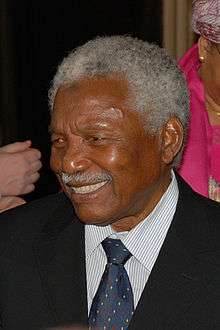Ali Hassan Mwinyi
| Ali Hassan Mwinyi | |
|---|---|
 | |
| 2nd President of Tanzania | |
|
In office 5 November 1985 – 23 November 1995 | |
| Prime Minister |
Joseph Warioba (1985–90) John Malecela (1990–94) Cleopa Msuya (1994–95) |
| Preceded by | Julius Nyerere |
| Succeeded by | Benjamin Mkapa |
| 3rd President of Zanzibar | |
|
In office 30 January 1984 – 24 October 1985 | |
| Preceded by | Aboud Jumbe |
| Succeeded by | Idris Abdul Wakil |
| Personal details | |
| Born |
8 May 1925 Kivure, Pwani Region, Tanzania |
| Nationality | Tanzanian |
| Political party | CCM |
| Spouse(s) | Siti Mwinyi (m. 1960) |
| Relations | Hussein Mwinyi (son) |
| Children | 12 |
| Religion | Islam |
| Nickname(s) | Mzee Ruksa |
Ali Hassan Mwinyi (born May 8, 1925 in Kivure, Pwani Region, Tanzania) is a retired second President of the United Republic of Tanzania from 1985 - 1995.[1][1]
Previous posts include Interior Minister and Vice President.[1] He also was chairman of the ruling party, the Chama Cha Mapinduzi (CCM) from 1990 to 1996.[1]
Presidency
During Mwinyi's terms Tanzania took the first steps to reverse the socialist policies of Julius Nyerere. [2] He relaxed import restrictions and encouraged private enterprise. It was during his second term that multi-party politics were introduced under pressure from foreign donors. Often referred to as Mzee Rukhsa ("Everything goes"), he pushed for liberalization of morals, beliefs, values (without breaking the law) and the economy. He put these beliefs into practice by opposing religious fundamentalists who burned down pork butcheries; these were fanatics who claimed that eating pork contradicted their beliefs. He insisted that Tanzania was a free country and that individual freedom of beliefs was important. [3] Many argue that during Mwinyi's tenure the country was in transition from the failed socialist orientation of Julius Nyerere that brought its economy to its knees. It was during Mwinyi's administration that Tanzania made some of the crucial decisions towards the liberalization of its economy that paved the way for short-term economic growth.[4]
Personal life
Mwinyi married Siti Mwinyi in 1960, with whom he has six sons and six daughters. In retirement, Mwinyi has stayed out of the limelight and continues to live in Dar es Salaam.[1]
Honours and awards
Honours
| Order | Country | Year | |
|---|---|---|---|
| |
Order of Mwalimu Julius Kambarage Nyerere | |
2011 |
Honorary degrees
| University | Country | Degree | Year |
|---|---|---|---|
| The Open University of Tanzania | | Doctor of Letters | 2012[5] |
| The East African University | | Doctor of Philosophy in Business Management | 2013[6] |
Legacy
Eponyms
- Ali Hassan Mwinyi Road, one of the major roads in Dar es Salaam
- Ali Hassan Mwinyi Stadium, Tabora
- Schools:
- Ali Hassan Mwinyi Islamic Secondary School in Tabora Region
- Mwinyi Secondary School in Pwani Region
References
- 1 2 3 4 5 Europa Publications (2003). The International Who's Who 2004. Routledge. p. 1193. ISBN 1-85743-217-7.
- ↑ Brennan, James R.; Burton, Andrew (2007). Dar es Salaam: histories from an emerging African metropolis. African Books Collective. p. 252. ISBN 9987-449-70-0.
- ↑ Cowen, Michael; Laakso, Liisa (2002). Multi-party elections in Africa. James Currey. p. 295. ISBN 0-85255-843-0.
- ↑ Pike, John. "Tanzania - Ali Hassan Mwinyi". www.globalsecurity.org. Retrieved 2016-10-11.
- ↑ "Why OUT awarded Mzee Ruksa a honorary degree". IPP Media. 24 March 2012. Retrieved 7 February 2013.
- ↑ "Former President Mwinyi conferred with PhD". in2eastafrica.net. 2 June 2013. Retrieved 12 November 2014.